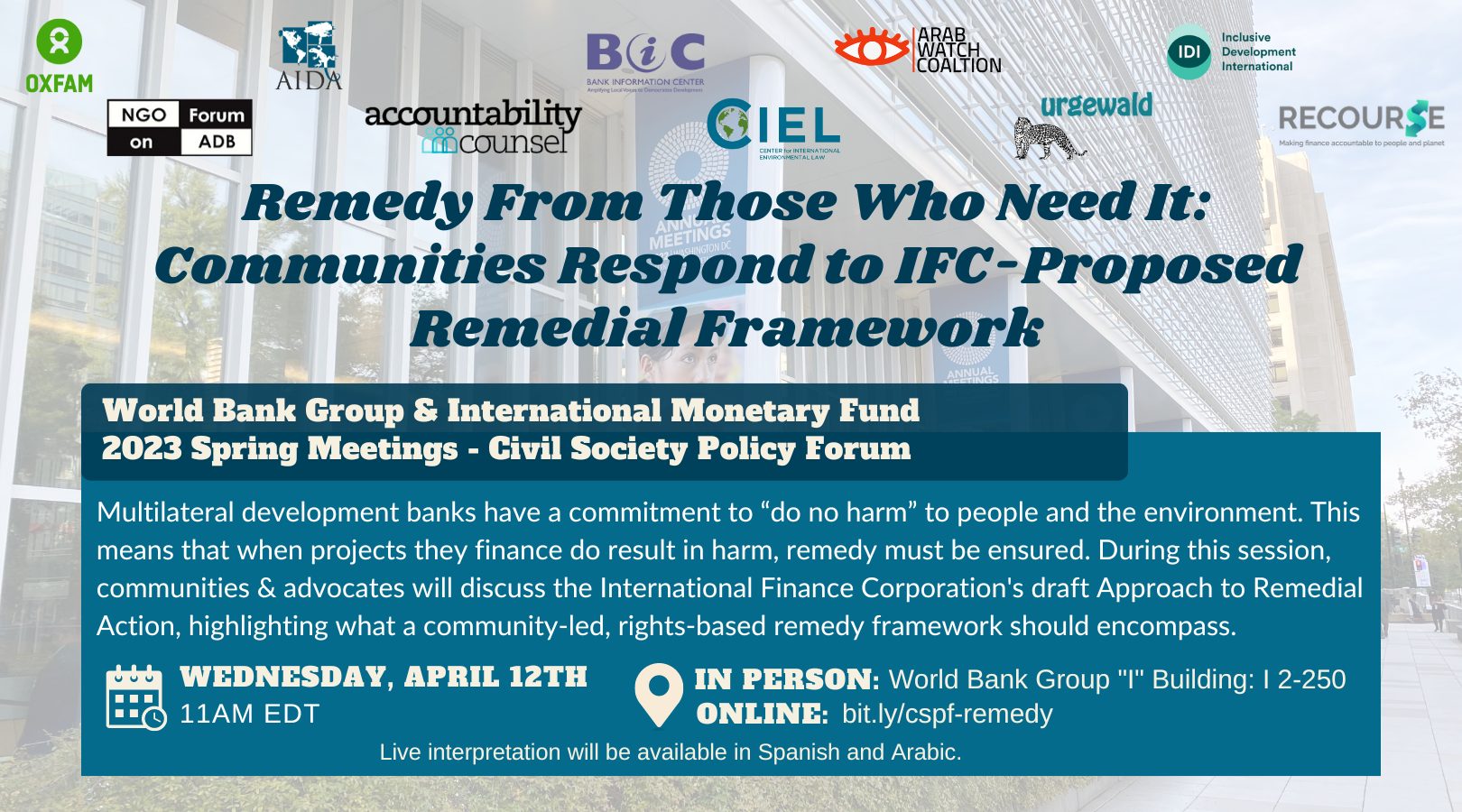Arab Watch Coalition Participates in IMF and World Bank Spring Meetings
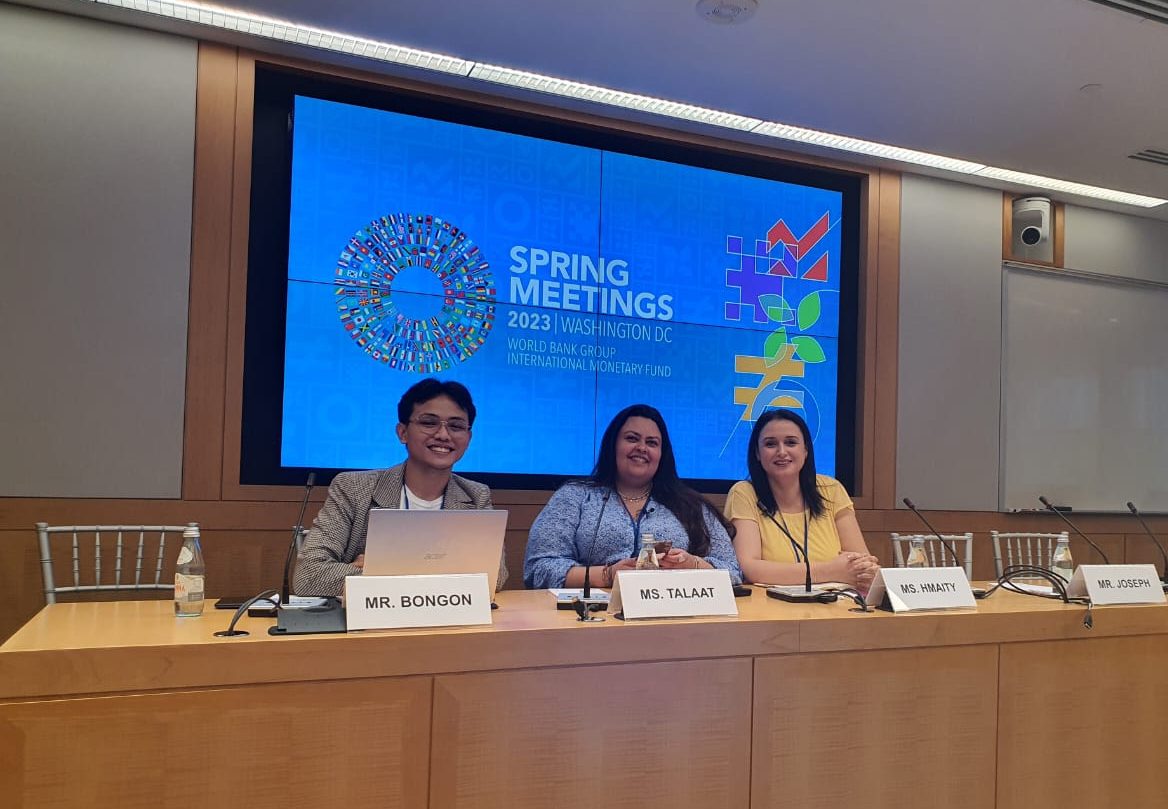
The Arab Watch Coalition recently participated in the World Bank Spring Meetings, held from April 10th to April 15th 2023. Our coalition played an active role in various events and discussions, highlighting the urgent need for action on several critical issues.
Roundtable Discussion with CSOs and the Board of the World Bank
In a powerful intervention during the Roundtable Discussion with CSOs and the Board of the World Bank, Arab Watch Coalition’s co-executive director, Amy, expressed her concern over the International Finance Corporation’s (IFC) divestment from an active case with the Office of the Compliance Advisor/Ombudsman (CAO). She stated that the IFC’s Management Action Plan (MAP) is leaving the community paying a hefty price for the IFC to “learn free lessons” for future investments.
Communities file complaints not to give the IFC free lessons at the expense of their suffering, but to seek remedy for the harm caused by international development projects. Her comments were made in the context of a petition signed by 4,577 individuals from around the world, demanding that the IFC guarantee justice for communities harmed by such projects.
The petition was hand-delivered by a coalition of civil society organizations to the IFC Board during the Spring Meetings of the World Bank Group and the International Monetary Fund. The call for justice echoes similar statements made by organizations in recent weeks.
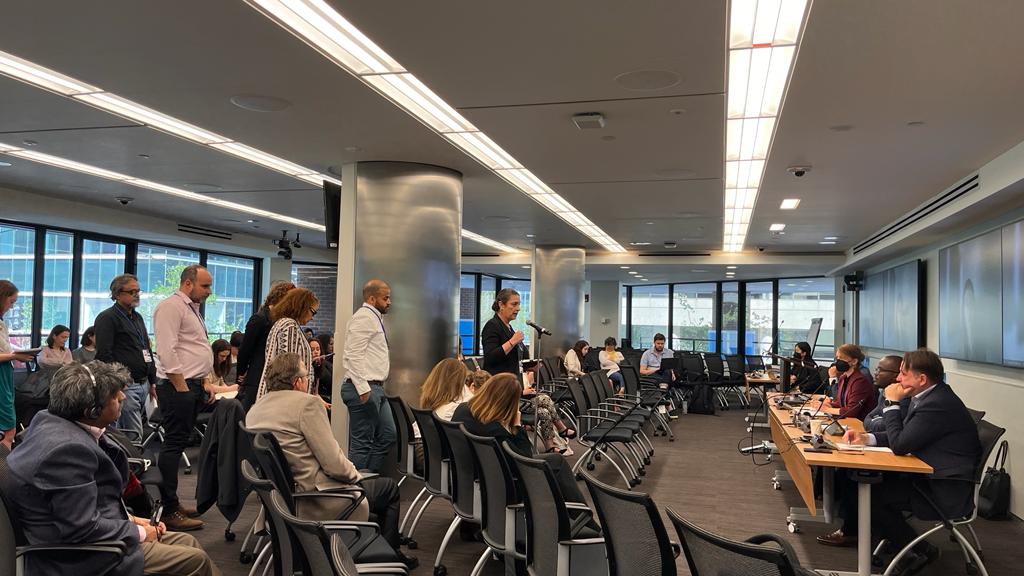
World Bank Day
On Friday, April 14th, Arab Watch Coalition participated virtually and in a collective march on World Bank Day alongside a “Trojan Horse” that embodied all the Bank’s uncomfortable secrets, such as fossil fuel finance and growing debt-distress in the Global South. The coalition emphasized that this is a marathon, not a sprint, and that real change will not come until the World Bank approaches fossil fuel finance in a radically different way.
During the march, the coalition put forth key demands for Multilateral Development Banks (MDBs), such as the World Bank, which manage billions of dollars of public money. They called for a phased-out approach to direct and indirect finance to fossil fuels, promoting a just transition, and significantly scaling up investment in sustainable renewable energy while ensuring everyone has access to clean, safe energy.
The coalition emphasized the importance of strong environmental, social, and governance safeguards relating to fossil fuels and renewable energy. They called for transparency and accountability about direct and indirect energy finance and in measuring emissions from the projects that MDBs fund.
The coalition’s participation in the World Bank Day march underscored the urgent need for a radical overhaul of the World Bank’s approach to fossil fuel finance. They emphasized the importance of MDBs in financing the shift to a sustainable, renewable global energy system and called for the implementation of strict environmental, social, and governance safeguards. The coalition’s demands are critical for ensuring a sustainable future and holding MDBs accountable for their actions.
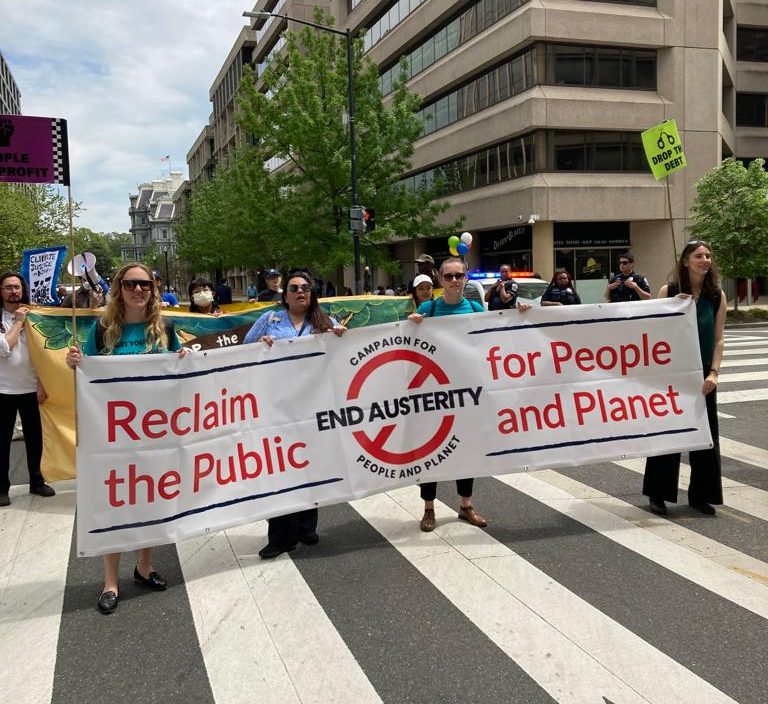
Our Session “How can the global south achieve climate justice under debt burden and austerity?”
Arab Watch Coalition co-organized in a session titled “How can the global south achieve climate justice under debt burden and austerity?” The session aimed to discuss the impact of debt burden and austerity measures on achieving climate justice in the Global South.
The speakers emphasized the urgent need for immediate action to address climate change, while also pointing out the burden faced by Global South countries in addressing climate change risks despite contributing less to global pollution. The Arab Watch Coalition’s participation in this session underscores the need for more equitable distribution of resources and abandonment of neoliberal policies exacerbating the debt burden to achieve climate justice.
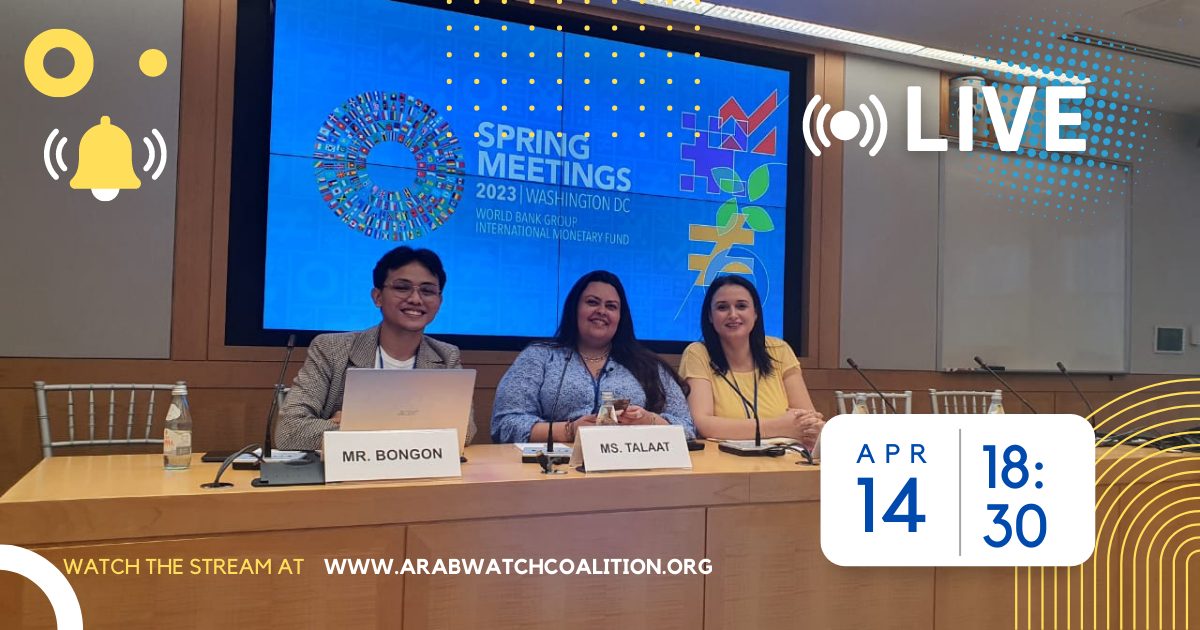
Our session on “the role of Special Drawing Rights (SDRs) in times of debt and austerity in the MENA”
The discussion highlighted the pressing need for new SDRs to resolve the ongoing crisis in the region. The coalition emphasized that the current levels of debt and austerity policies are unsustainable and require immediate action.
During the discussion, the participants also called on the IMF to be more responsive in terms of surcharges, which are fees charged to countries when they borrow from the IMF. This additional burden on countries already struggling with debt needs to be addressed, particularly given the severe economic challenges that many MENA countries face.
The participants also highlighted the fact that a closer examination of the value of SDRs is necessary to fully understand their potential in resolving the current crisis. The last allocation to Egypt ended only a month after its issuance and represented only a fraction of the Egyptian state’s exports for the month, demonstrating the need for a more comprehensive approach.
Finally, the discussion stressed the urgent need for reform in the IMF’s governance structure. The current structure is outdated and does not adequately reflect the interests of MENA countries. Participants called for a new governance structure that would be more inclusive and responsive to the needs of all member countries.
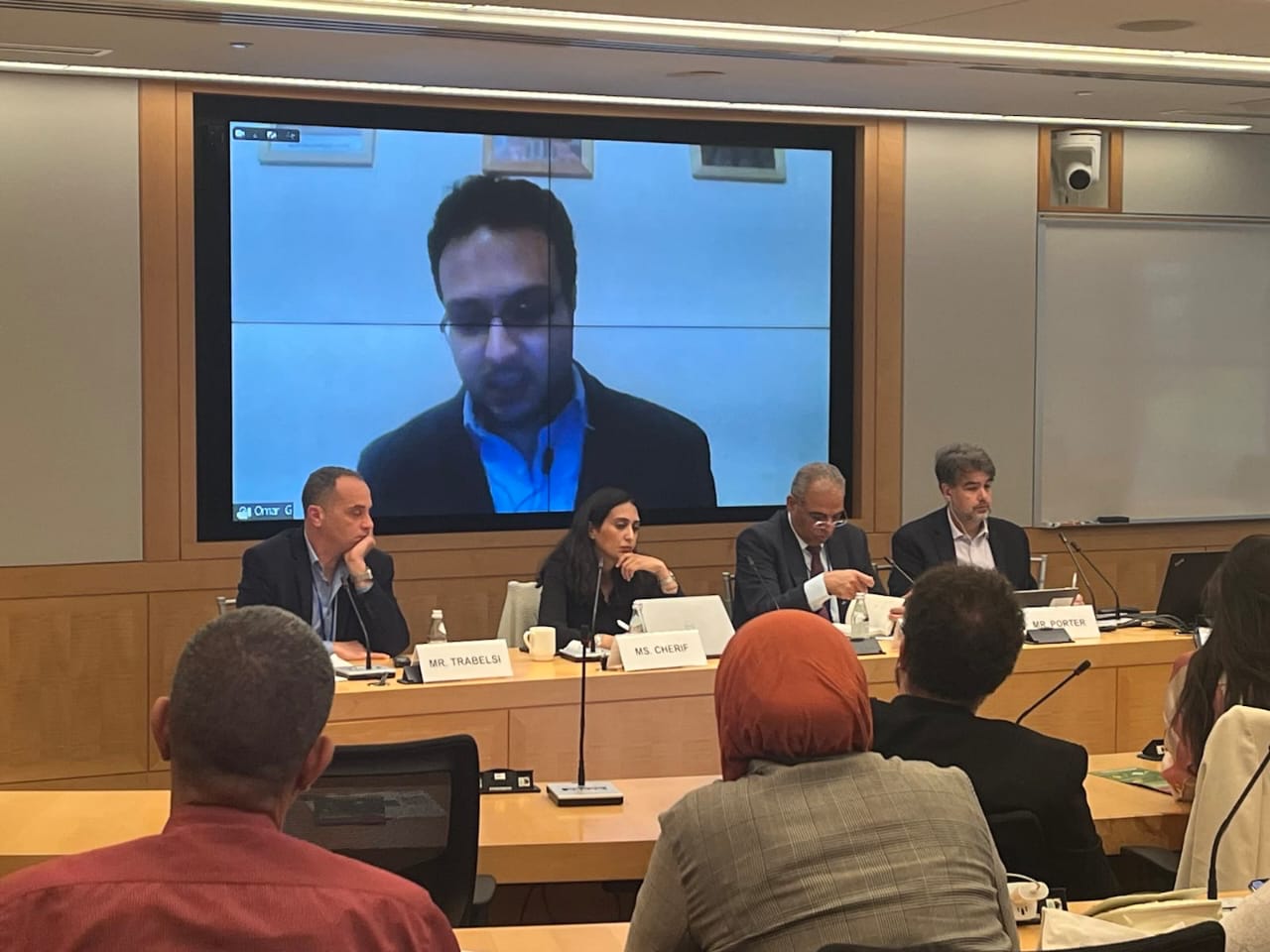
Remedy From Those Who Need It: Communities Respond to IFC Proposed Remedial Framework
Multilateral development banks have a commitment to “do no harm” to people and the environment. This means that when projects they finance do result in harm, remedy must be ensured. During this session, communities & advocates discussed the International Finance Corporation’s draft Approach to Remedial Action, highlighting what a community-led, rights-based remedy framework should encompass.
